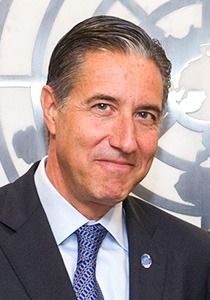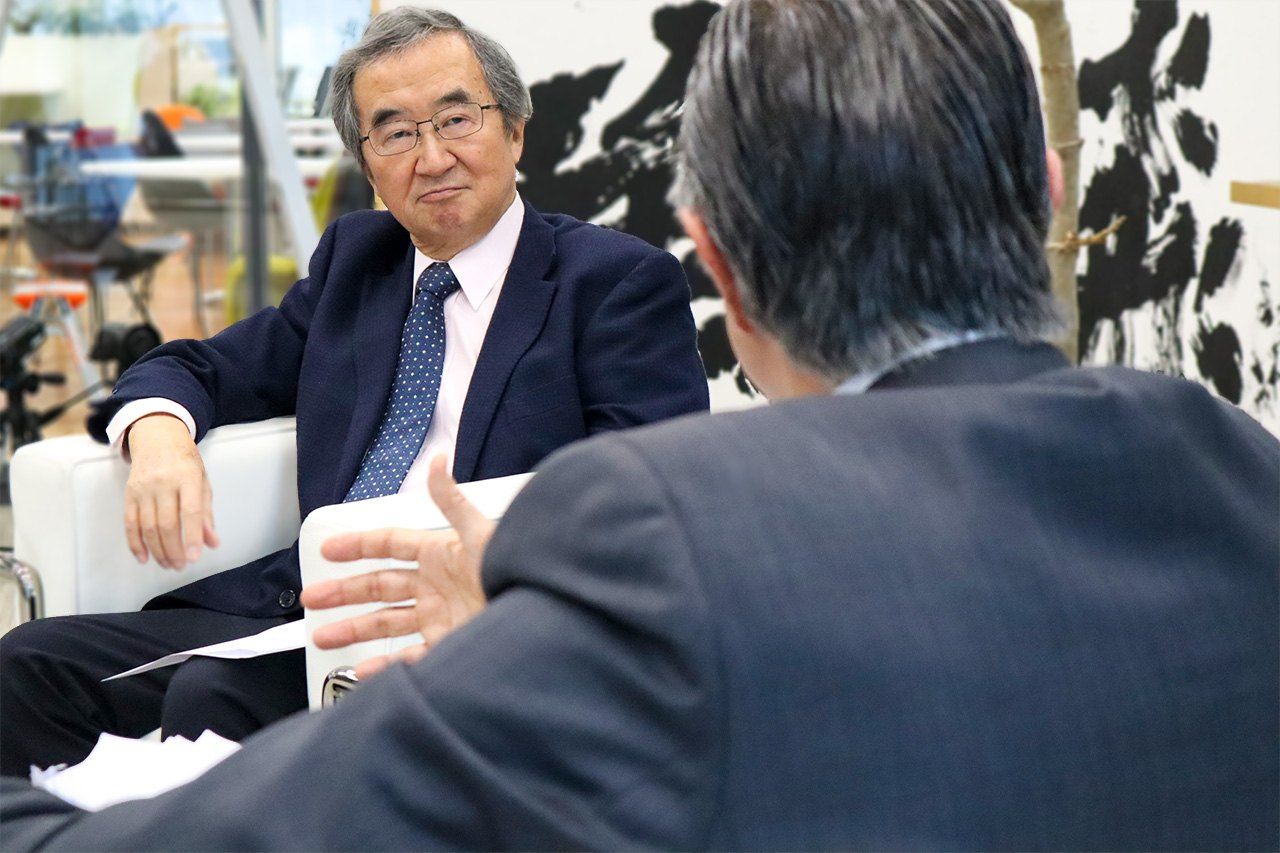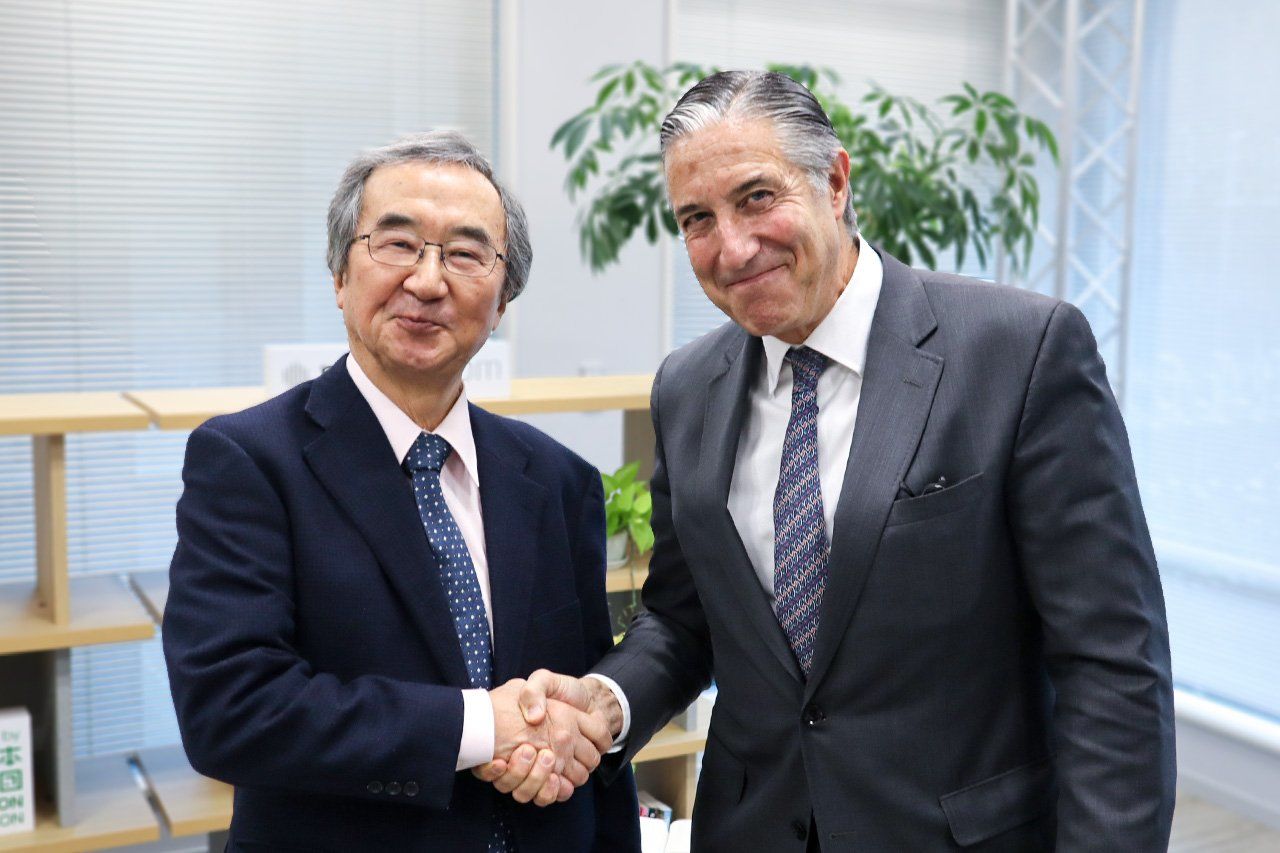
Development and the Desire for Reform: The United Nations and Prospects for Japan’s Role
People World Politics- English
- 日本語
- 简体字
- 繁體字
- Français
- Español
- العربية
- Русский
An SDGs Progress Report
INTERVIEWER Welcome to Tokyo, and congratulations on your new position as assistant secretary-general for development coordination. You deal with development, especially the Sustainable Development Goals, which is closely tied to climate change issues. We’re now in the midst of the COP28 gathering; what sort of outcomes do you expect?
OSCAR FERNÁNDEZ-TARANCO The eyes of the world are focused on the discussions at COP28 in Dubai right now, to see how we can address the issues of very rapid climate change. There’s a real sense of dramatic change happening in our lifetimes—the megastorms, hot summers, repeated flooding, extended drought, wildfires. Climate change is impacting us all, from least developed countries to developing and developed ones as well. We need collectively to take action.
The science tells us that we’re very late in addressing climate change. We hope there will be an agreement on quick actions to adapt to and mitigate its impact, but also on the financial front—to build the Loss and Damage Fund that was agreed to at the last COP meeting.
The reality check is how quickly we can convert promises into actions. It’s still not too late, but our time is shrinking. The world is hoping for policies and investments that can curb emissions dramatically. It’s also hoping for countries like Japan—leaders in technological innovation—that can convert their wealth of science and knowledge into energy and other solutions.
It’s also a question of climate justice; how do we bring about clean energy for all? This global shift to renewables is inevitable, but the faster we do it the more chance we have to leave a better world to future generations. If we’re going to address global hunger and poverty, or meet the SDGs, we’ve got to deal with climate change as a driver of instability. It’s an existential threat.
INTERVIEWER Addressing climate change is of course a part of the SDGs. Where do we stand there now? Are we on the right track?
FERNÁNDEZ-TARANCO Well, in Japan the SDGs are an important part of policy, as well as the education curriculum. These goals aren’t just a UN agenda; they’re a member-state agenda driven by policies in each country. But we need to focus on the fact that the SDG construct is important in addressing the real needs of the world—poverty, climate change, ending exclusion. A central notion is leaving no one behind. Making sure that women are equal partners, giving a voice to youth.
The fact that UN member states have recommitted to this is very important in this moment of tensions in the world. But I have to say that I don’t think we are in very good shape. We’ve only met some 15 percent of the goals, although we should have been halfway there by now. We need courage, political determination, and real action based on scientific solutions. But we also need to make sure that a nimble, effective United Nations can keep delivering a message of hope in these areas. This agenda is exciting because it asks all of us to change the way we do business. We’re in the business of interacting with people.
Inclusivity and an End to Conflict
INTERVIEWER In the area of the Millennium Development Goals, China and India made significant progress in reducing poverty. With the SDGs, who is leading the way now?
FERNÁNDEZ-TARANCO We do see some good progress among the so-called emerging powerhouses of the global South—India, but also places like Indonesia and Brazil. They’re trying not just to grow economically, but to transform their economies to address the impact of climate change.
The SDGs are more sophisticated than the former MDGs. They are an integrated agenda addressing education, poverty, women’s empowerment, and good governance. The concept of inclusive, sustainable development is an extremely important one. It isn’t just development. Indeed, the more inclusivity we see, the more rapid development we can achieve. And increasingly, the United Nations is playing a facilitation role, bringing actors to the table—from the private sector, foundations, civil society, local and national authorities.
This is the dynamic we’re involved in. We have ideas about what needs to change in global governance. Why do things like the UN Security Council or the World Bank need reform? Many of these constructs belong to the period of history just after 1945, and are no longer responding to the needs of this moment—threats to peace, the climate, or people on the move due to these issues or a lack of opportunities.
INTERVIEWER Conflicts today are most notable in Ukraine and in Gaza. Are these taking attention and resources away from development needs? Do you see a potential end to these conflicts?
FERNÁNDEZ-TARANCO We’re in a moment of geopolitical divides, but the UN Charter remains a valuable, foundational document. It upholds international norms and rights. I believe the light of hope you’re looking for is the United Nations. As divided as the member states may be, the UN remains the only institution that can attract them all.
But the UN is there to ensure that Member States are respecting these principles and abiding by the agreements that they themselves have signed on to. We’ve specifically agreed to protect civilian lives from the ravages of war, and these principles apply to all parties on any side of a conflict. We have to remain impartial and focused on the fact that these rights belong to everyone.
Thinking About UN Reform
INTERVIEWER The importance of the United Nations and the role of the Secretary-General seem to be better appreciated in European countries, and even in the United States. A Pew Research Center survey this summer showed UN favorability ratings in the 60 to 80 percent range in Europe and 58 percent in the United States. In Japan, though, the numbers are much lower—around 40 percent, and even this is up from 29 percent some years ago—as people tend to equate the role of the UN with the Security Council, which appears dysfunctional to many. There are hopes in Japan for UNSC reform, and perhaps for semipermanent membership for Japan. Are there any prospects for this?
FERNÁNDEZ-TARANCO I believe the United Nations has put some elements of reform back on the table. As an intergovernmental body, though, the UN constructively moves forward on issues when it doesn’t focus on just one of them—the development agenda, humanitarian responses, peace and security, or human rights—but takes them as an integrated construct. Of course, we can take on small projects and achieve some progress, but the level of scaling up that we need today requires a different way of doing things.
As with any institution, the reform of the Security Council needs to be done in ways that make it more inclusive, representative, and responsive. Now the Council is behind in all three of these areas. And the issues that the Council can’t resolve are increasingly going to the General Assembly.
The Summit of the Future to be held next year will be an important opportunity to reform the UN Security Council, as well as the Bretton Woods institutions, which were also founded soon after the end of World War II. These, too, are not delivering on the needs of the moment.
In much of the world, the perception of the UN is very low. But this isn’t because there’s no value in what the UN is doing, meaning the agencies and programs that are doing life-saving work and protecting people’s human rights. Rather, it’s the “Member State UN” that’s viewed as the United Nations. In reality, of course, it’s both of these. As a body, the UN can only provide options and visions of potential change. It’s up to members like Japan to bridge the differences that can paralyze the Security Council.
INTERVIEWER I think Japan still hopes to play a greater global role. But the Japanese people are worried about the future as their population shrinks, along with the economy. So there’s concern about Japan’s international prestige. Is Japan still seen as an important player in the UN?
FERNÁNDEZ-TARANCO Japan’s postwar focus on peace and its support for the United Nations display its clear dedication to multilateralism. As an institution that tries to share knowledge, development experiences, and technology, the UN views Japan as a key leader on issues like climate change. The world today requires the generosity and solidarity that Japan has always provided.
Japan will be taking on an important role in the global development effectiveness agenda moving forward. It’s a question of taking leadership, whether it be in the UN Security Council, the General Assembly, or the Economic and Social Council.
Japan’s contributions to the UN are extremely important. But a lot of the contributions to the budget go to peacekeeping and special political missions. We’re in the business of making sure that these peacekeeping activities don’t need to happen. This is where the investments in development are much more strategic in the long term, since smaller amounts directed here can prevent the very costly mechanisms of the construct of peacekeeping later on.
At the moment, the development coordination system is not fully funded. Without support for the UN Resident Coordinator system, and flexible resources for the UN development system, it is very hard to have a UN that is more coherent, more efficient, and more strategic at the country level. Japan is a key leader in many aspects of promoting multilateralism and the Sustainable Development Goals, and in fostering dialogue for world peace, preventing conflict, and allowing development to happen.
Through human security and inclusive development approaches, we’re trying to address the drivers of conflict and instability before they become a problem. This is why in any budget and in any decision, the focus on development and on improving peoples’ basic conditions—the aspiration to end hunger, to end poverty, to provide livelihoods and a fair chance—is so important.
(Originally written in English based on a December 7, 2023, interview at the Nippon.com office in Tokyo. Interviewer Akasaka Kiyotaka is president of the Nippon Communications Foundation. All photos © Nippon.com.)



